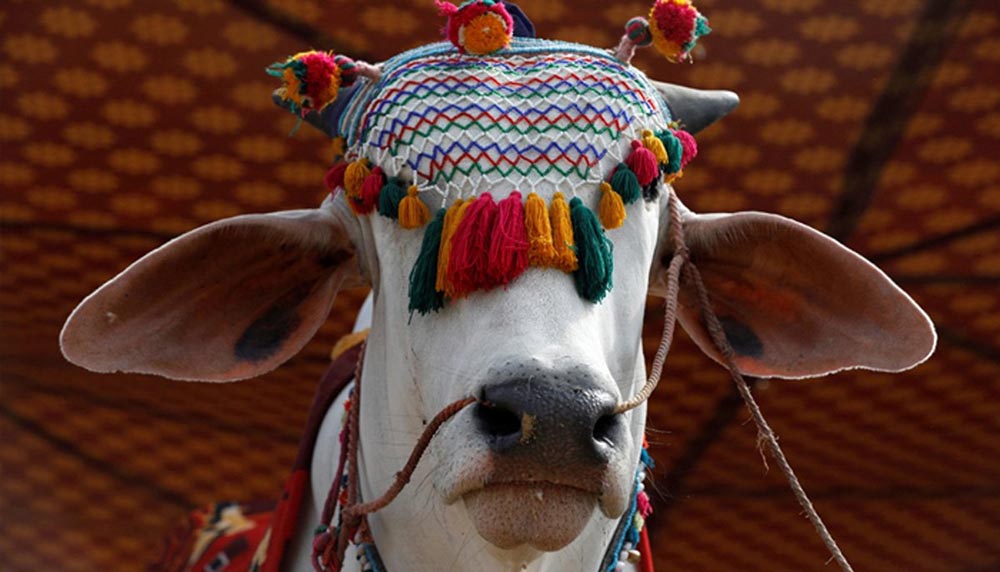
Written by: Staff Report
Posted on: July 31, 2020 |  | 中文
| 中文
Goats at the Cattlemarket (photocredits to arabnews.pk)
Muslims all over the world look forward to the Eid holidays when families reunite, and marketplaces are lit with lights and buzzing with shoppers. However, this Eid will be celebrated differently, with respect to the ongoing COVID-19 pandemic. But given the recent developments in COVID cases in Pakistan, it is more vital than ever to observe SOPs and to celebrate Eid responsibly.
Eid-ul-Adha (also known as ‘Big Eid’ or ‘The Eid of Sacrifice’) is one of the two major Muslim holidays celebrated during the Islamic year, taking place on the 10th day of the Islamic month of Zu al-Hajj. It commemorates the Prophet Abraham (AS)’s sacrifice of his son for God, and how God sent a lamb in his son’s place. Since then, Muslims annually sacrifice certain animals, in memory of the Prophet Abraham (AS)’s commitment to the word of God. The day also coincides with the Hajj or ‘annual pilgrimage’, which takes place in Mecca and is one of the five tenets of the Islamic faith. While Eid-ul-Fitr is focused on reward, Eid-ul-Adha is about ritual, sacrifice, giving up parts of oneself for one’s belief and the greater good.
The morning begins with Eid prayers, followed by the sacrifice of the animal. Right after, the sacrificed meat is divided into three portions for oneself, one’s friends and relatives, and the poor and needy. Meat-centric dishes are prepared in large quantities, to be distributed generously amongst friends, neighbors and communities. Children and families dress up for the occasion, as they get together to eat and spend time with each other during the holidays.
Eid is not just a cultural and religious holiday, but an important economic event in the country, from which many earn significant portions of their income. According to Pakistan Businessmen and Intellectual’s Forum, in 2018 alone, economic activities relating to the sacrifice of animals around Eid amounted to Rs. 335 billion, with butchers earning Rs. 26 billion, and animal hides amounting to Rs. 10 billion. This, along with the purchase of clothes and accessories for Eid, only spur on the economic activity. The income made at this time is particularly vital for people from rural areas, who bring cattle to the marketplace to make a living.
This is our second Eid during lockdown due to the ongoing pandemic, and due to fears of the virus spreading, it will be another holiday away from loved ones, and gatherings. Although this does not mean that these religious obligations are cancelled, rituals and celebrations will be held in a more restrained fashion. Even Hajj is not immune to social distancing measures; it is estimated that only a thousand pilgrims are performing Hajj, as opposed to the usual 2.5 million who venture to the holy cities.
As the official number of COVID cases in Pakistan steadily decrease, there is hope that the country will successfully flatten its curve, and return to normal circumstances in the near future. But there is also fear of a new spike, due to unchecked Eid preparations and festivities. At this critical juncture, UN representatives have urged Pakistan to continue practicing caution and quarantine. Prime Minister Imran Khan has asked citizens to abstain from gathering in large numbers, especially with the news that SOPs are not being met in the cattle markets.
While readers celebrate their Eid in quarantine, there are ways in which they can continue their traditions, and benefit their community from home. Online purchasing of animals and sacrifice on people’s behalf, are new yet effective ways to make sure all obligations are fulfilled. Charities like Shaukat Khanum, Akhuwat and other local organizations can take donated hides, and sell them appropriately.

A Bull Adorned with Decoration at a Cattle Market in Karachi (photo credits to Reuters_Akhtar Soomro)
At this point, it is wise to remind readers to adhere to social distance protocols and refrain from sacrificing animals on the streets/roads. Livestock markets and butchers should be given designated spaces to perform the annual rituals. Moreover, there must be a brief period of close observation of makeshift marketplaces of cattle, in order to prevent new outbreaks of the virus following the holiday.
While this is no easy feat to accomplish for the government, following SOPs should be seen as every individual’s responsibility and in the spirit of sacrificing personal benefits for the greater good of society. Team Youlin wishes our readers in Pakistan, China and beyond a very happy and safe Eid.
You may also like: